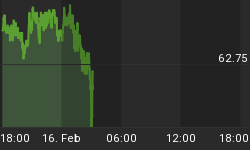As we enter the height of the hurricane season, it may be worthwhile to recall, when considering the economy at large, the particular deception that lurks in the "eye" of the storm. After a raging tempest, the sudden appearance of the calm 'eye' can all too easily encourage people to leave their shelter in order to assess and even repair damage, exposing themselves to the often more devastating second leg of the hurricane.
We have long warned our readers of a coming real estate crash which would then lead to a credit crunch, and eventually a major round of bank failures. We have argued that these developments would be the precursors to a major recession, and perhaps a depression.
As predicted, the collapsing values of bonds backed by subprime mortgages did indeed lead to a collapse of the entire mortgage market, a bank liquidity crisis, a credit crunch and a steep fall in consumer confidence. This was the first leg of the storm, but the full blown banking collapse and the deep recession are not yet manifest. The conventional wisdom holds that the bullet has been dodged.
The markets are buying this hypothesis. Tempted by the latest crop of economic data that seems to show expansion, U.S. stocks have moved sideways, and even climbed slowly. The U.S. dollar has risen from its lows, and the rate of bank failures appears to be under control. In short, with gold off almost twenty percent from its highs, it looks as if many investors have concluded that the worst of the storm has past, and have decided look for good deals amid the stock market wreckage. Proceed with caution.
At its core, our economy is simply showing the effects of a national depletion of wealth caused by decades of consuming more than we produce and spending more than we earn. The natural corrective mechanism to such a condition is a recession. But recession is very bad for politics, especially in an election year. So, the potential corrective recession has been postponed by a massive injection of billions of dollars into the economy. At a time when we needed serious physical therapy, the government instead offered four massive pain killers:
-First, the debased U.S. dollar has boosted exports and helped the GDP to remain positive.
-Second, by setting interest rates below the rate of inflation the Federal Reserve discouraged savings and encouraged borrowing and spending.
-Third, massive government lending kept the financial service industry solvent and the mortgage lenders operating.
-Fourth, stimulus checks have kept American's spending money that they have not earned.
Although these government palliatives have succeeded in calming the immediate crisis (by saddling American taxpayers with massive liabilities), they have not cured the disease. If anything the huge doses indicate that the patient is getting far worse, even if in silence!
Last week, the FDIC announced that bank losses have tripled to $26.4 billion, leading to a fall of 86.5 percent in bank earnings. The Case- Shiller home price index shows American housing to have fallen in value by some 20 percent and still sliding. These massive movements have yet to be felt along the entire economic spectrum...but it is inevitable that they will be.
Don't be lulled into a false sense of security and start buying U.S. equities at seemingly knockdown prices. We are in the eye of the hurricane. Beware of the second leg!
For a more in depth analysis of our financial problems and the inherent dangers they pose for the U.S. economy and U.S. dollar denominated investments, read Peter Schiff's book "Crash Proof: How to Profit from the Coming Economic Collapse." Click here to order a copy today.
More importantly, don't wait for reality to set in. Protect your wealth and preserve your purchasing power before it's too late. Discover the best way to buy gold at www.goldyoucanfold.com, download our free research report on the powerful case for investing in foreign equities available at www.researchreportone.com, and subscribe to our free, on-line investment newsletter at http://www.europac.net/newsletter/newsletter.asp.
















